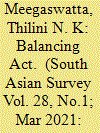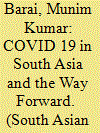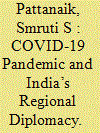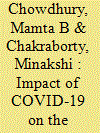|
|
|
Sort Order |
|
|
|
Items / Page
|
|
|
|
|
|
|
| Srl | Item |
| 1 |
ID:
177779


|
|
|
|
|
| Summary/Abstract |
The global spread of the COVID-19 pandemic has had a devastating impact on women: female care workers are at the forefront of the crisis and are facing increased health risks; women are disproportionately affected by the employment drop related to COVID-19 lockdowns and social distancing measures; they are exposed to an alarming increase in domestic violence and are shouldering heavier burdens at home in times of restricted movement. In other words, the COVID-19 pandemic has exacerbated existing gender inequalities and vulnerabilities. While available reports and research crystallise the challenges faced by other vulnerable groups in general, there is a lack of insights to the unique challenges faced by formally employed women while negotiating the dynamics of home during full lockdowns. This lacuna is especially applicable to the Global South, given that the overwhelming majority of available research focuses on Western societies. In this backdrop, this article explores how formally employed women navigated the COVID-19 lockdown in Sri Lanka. A feminist reading of data gathered through a structured online questionnaire from 50 formally employed women as well as 15 men for the purpose of a comparative analysis sheds light on how far and in what ways employed women were able to balance their professional and personal commitments in a time of increased uncertainty and anxiety, while adopting new practices and deploying new skills. The article concludes that in spite of gendered expectations and challenges, employed women have been able to straddle both professional and domestic duties largely due to the unique resources available to them within the South Asian household. In addition, the article observes that the COVID-19 lockdown in Sri Lanka has opened up new spaces and practices that encourage both employers and employees to enable the better reconciliation of personal and professional spheres.
|
|
|
|
|
|
|
|
|
|
|
|
|
|
|
|
| 2 |
ID:
177769


|
|
|
|
|
| Summary/Abstract |
The world has been experiencing an unprecedented level of disruptions of all activities since COVID-19 began to spread in China in late 2019 and then turned into a truly global pandemic within a couple of months. A year after, millions of people in over 219 countries and territories have either got infected or died of the disease (Worldometer, 2021). Indeed, COVID-19 has only one close parallel in the recent past by its disruptive ability, though differently. The Global Financial Crisis of 2007–2008 started in the US housing market that engulfed the entire world’s economic and financial system.1 Similarly, COVID-19 began from Wuhan in China and then has spread out very quickly to affect the entire human civilisation in one way or another. So, both could be traced to a single individual source but with global ramifications. However, the extent of damage of COVID-19 has become much greater, larger and long-term in orientation. Herein, a pertinent question arises: is there a correlation between the degree of globalisation and the quickness of the spread of both the catastrophes and the degree of their damage? The answer is ‘yes’.
|
|
|
|
|
|
|
|
|
|
|
|
|
|
|
|
| 3 |
ID:
177774


|
|
|
|
|
| Summary/Abstract |
The Novel Corona Virus (COVID-19) has created tremendous negative impacts on the livelihood of the marginal population in Bangladesh. Many people working in the informal sector have lost their job and income due to the ongoing pandemic. Unemployment and poverty among the people in both urban and rural areas throughout the country have increased. The success in economic growth in the last few decades could not save poor people to become extreme poor because economic prosperity was not inclusive in Bangladesh. This study tries to identify some of the impacts that COVID-19 has imposed on the lives of marginal population. Then it indicates some of the serious limitations of the existing economic policies. This article suggests that only growth-oriented policy measures are not sufficient to reconstruct the economy in the post-COVID era. Rather Bangladesh needs to adopt employment-oriented economic policies that are capable to create more jobs and reduce poverty and inequality.
|
|
|
|
|
|
|
|
|
|
|
|
|
|
|
|
| 4 |
ID:
177776


|
|
|
|
|
| Summary/Abstract |
The COVID-19 pandemic placed enormous stress on the fledgling health infrastructure in the South Asian region. The economic distress compounded the problem as many business houses closed down and people working in the informal sector lost their jobs. The governments in the region, except in Pakistan, went for a complete lockdown to contain the spread of the pandemic. India which prides itself as the ‘Pharmacy of the world’ geared up to provide humanitarian assistance by supplying essential medicines, ventilators and providing rapid-action teams consisting of medical professionals to assist its neighbours as a first responder. It also supplied vaccines to the immediate neighbourhood once they were ready. India’s health diplomacy enhanced its soft-power projection and helped it project itself as a country that is concerned about its neighbours—a major shift in its regional diplomacy, compared to the Cold War period. This article maps India’s regional diplomacy in the historical context and analyses the making of India’s regional diplomacy in the context of COVID-19 pandemic.
|
|
|
|
|
|
|
|
|
|
|
|
|
|
|
|
| 5 |
ID:
177775


|
|
|
|
|
| Summary/Abstract |
Governance can help minimise the effects of catastrophes. Countries had some time to prepare for the current coronavirus disease 2019 (COVID-19) pandemic, but some did not use it to improve their arrangements. This research investigates several countries’ governance strategies, develops a governance model and critically analyses Bangladesh’s failure as a case of governance catastrophe. This study applies qualitative methods of textual data analysis to explore data sourced from current newspapers, blogs, websites, journal articles and books to determine the most appropriate evidence and generate connections and interpretations. The COVID-19 pandemic has had devastating consequences for all countries; however, the different national responses have provided the opportunity to measure governments’ capability in addressing the crisis. Governments need to study the current COVID-19 response and enhance their governance capacities to minimise the spread of infection and to prepare for the challenge of socio-economic recovery.
|
|
|
|
|
|
|
|
|
|
|
|
|
|
|
|
| 6 |
ID:
177773


|
|
|
|
|
| Summary/Abstract |
This study examines the impact of COVID-19 on the migrant workers and remittances flow to Bangladesh, the fastest growing South Asian country. Migrant workers have been playing an important role in propelling the economic activities of the country for a vast majority of the low-income population. Bangladesh is one of the major remittance recipient countries and earned US$21.8 billion in 2020. Over half a million workers from Bangladesh are employed in foreign countries annually, which eases the pressure on the domestic labour market considerably. However, the inflow of these enormous remittances has been encountered by various challenges including the ongoing COVID-19 pandemic, which has brought numerous adverse socio-economic impacts on the migrant workers. Policy recommendations suggest designing and implementing well-coordinated public–private migrant workers’ inclusive policies and creating a supportive environment for the returnee migrant workers to overcome this crisis. Initiating dialogues and negotiation with the employing countries to protect the jobs and workers’ rights can restore the employment and remittances during and after the pandemic, facilitate the expansion of the labour market across borders, and harness the valuable remittances for the overall welfare of the country.
|
|
|
|
|
|
|
|
|
|
|
|
|
|
|
|
| 7 |
ID:
177777


|
|
|
|
|
| Summary/Abstract |
South Asia has emerged as a major challenge in dealing with COVID-19 virus in terms of its demographics, economy, social values, political ambition and geographical location. The pandemic viewed through the prism of non-traditional security (NTS) threat presents new challenges and demands reworking of conventional governance mechanisms. India is the South Asian hegemon, and China is the single largest immediate neighbour with expansionist ambition in the region. Two most populous countries—one has been the epicentre of the virus, while the other is one of the most widely affected. Their public health and governance trajectory during the pandemic and their health diplomacy in the region have overtures for security architecture of South Asia in post-COVID-19 world. A lone statist approach and legal–institutional officialdom fail to appreciate the instrumentalities of an unconventional security threat like COVID-19. This calls for a more inclusive and comprehensive approach to deal with NTS threat, in general, and epidemiological disease, in particular. This by no means indicating a retreat of the state rather a proactive role in articulating interests of more inclusive categories and, in doing so, the state consolidates its role of governance and becomes a significant point of integration.
|
|
|
|
|
|
|
|
|
|
|
|
|
|
|
|
| 8 |
ID:
177780


|
|
|
|
|
| Summary/Abstract |
This study focuses on tracing the early economic impacts of COVID-19. The pandemic has unleashed a global shock impacting all economies in several ways. The lockdowns have brought economic activity to a standstill, with the closure of businesses and halting of travel, trade and commerce. Even as the impact on sensitive sectors as trade, tourism and remittances are already becoming visible, it is imperative to understand how these are impacting economies in Asia. This article studies these impacts on Thailand and Sri Lanka, both of which being wired to the globalised world, are witnessing adverse impacts on earnings through exports and tourism as well as a huge decline in inward remittances. Even as countries beef up their health infrastructure, they also seek to restart international travel and trade. Hence, the role of the state is critical to pull the economies out of the de-globalisation trends that are expected to gain pace in and beyond 2020.
|
|
|
|
|
|
|
|
|
|
|
|
|
|
|
|
| 9 |
ID:
177771


|
|
|
|
|
| Summary/Abstract |
The present study explores the socio-economic scenario of the South Asian region before and after the outbreak of the COVID-19 pandemic. It analyses the long run and short-run association between human development, unemployment and the economic growth of the region using the Pooled Mean Group (PMG) Autoregressive Distributed Lag (ARDL) model before the situation of the pandemic. It was found that human development has both short-run and long-run association, while the unemployment level has only a long run association with economic growth of the South Asian region. The study suggests that maintaining quality and growth sustainability during and after the pandemic situation will ultimately depend on the human development aspects of the region in terms of appropriate fiscal and monetary policy, vocational training, increased dependence on domestic production and consumption.
|
|
|
|
|
|
|
|
|
|
|
|
|
|
|
|
| 10 |
ID:
177778


|
|
|
|
|
| Summary/Abstract |
This comparative research looked at the causes of the variance in provincial response to COVID-19 in Pakistan using the policy capacity framework. Pakistan decentralised its policymaking in 2010 and granted autonomy to its provinces to mitigate the crisis, control law and order, generate resources and reform their institutions. There were serious concerns that the small provinces lacking the required policy competencies will not be able to deal with a crisis such as COVID-19. Using process tracing and inductive mixed methods, this research finds that the relationship with the centre, effective networking with international agencies, non-state actors and China-Pakistan Economic Corridor (CPEC) are the key factors that improved the policy competency of the small provinces, whereas the weak steering ability of the state machinery, complacent and negligent behaviour of the political and administrative institutions and tension with the centre adversely impacted the analytical, operational and political competencies of the two large provinces of Punjab and Sindh, resulting in the spread of COVID-19 cases in these provinces.
|
|
|
|
|
|
|
|
|
|
|
|
|
|
|
|
|
|
|
|
|